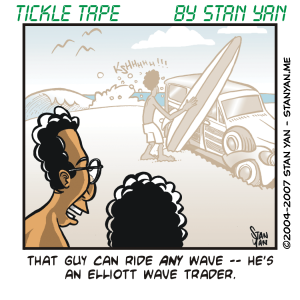It’s wise to learn from your mistakes. There’s no sense in making the same mistake twice. Despite the wisdom of this sage advice in everyday life, however, it may not work very well for trading. Sure, you shouldn’t make bad decisions, like risking 80% of your capital on a single, losing trade. You only need to make that mistake once to know it isn’t a good idea to do it again. There comes a point, however, when too much over-analysis and deliberation is fruitless. If you spend your life mulling over what you did wrong, or what you could have done, you’ll waste a lot of time and energy on the past to no avail. When it comes to trading, it is often best to just drop it and move on.
Sound decision-makers examine all their options before making a commitment. But when it comes to trading, there are times when you must limit your deliberations. You can’t overdo it. And in the end, once you’ve considered your options, there isn’t much else you can do. It is vital that you quickly make a decision and execute the trade. You may desire perfect, comprehensive information about the markets, but you’ll never find it. It would be nice to have infallible information and be able to sift through it carefully but that isn’t the way short-term trading works. You have a limited window of opportunity and you must act in a timely manner.
Once you rule out all possible adverse events, such as interest rate hikes or earning reports, you must take action. If you were to refine your golf or tennis swing, you wouldn’t mull over it. You would go out and practice. You would get as much experience as possible until you developed the skill you needed to execute your moves effortlessly and flawlessly. It is much the same way with trading. You need to execute as many trades as possible to get a feel for the markets. Ideally, you should trade under a variety of market conditions and hone your skills. There is a strong tendency, however, to hold back. Depending on your personality, you may be tempted to hesitate and worry about losing money.
Most of the time it is quite adaptive to worry about losing money. Humans are naturally averse to risk. We don’t like to lose. We don’t like to get hurt, and this tendency to avoid pain often gets in the way of making a swift decision. But winning traders are ready to take the risk. They are ready to put their money on the line, and they look forward to seeing what happens next. They know that there is no substitute for experience and you can’t gain experience if you hold back and shy away from executing trades. You must make trade after trade to pay your dues and gain the experience of a seasoned trader. Sure, you may lose money, but if you limit your risk, you’ll minimize your losses. And you can look at the money you lose as merely the “tuition” you must pay to learn how to trade.
Sometimes analogies are useful when learning how to trade. Trading is much like learning to master a skill. And mastering any skill requires practice. That means honing skills through gaining experience. And usually, it means viewing setbacks as opportunities to learn rather than as something to dread. So as you try to master the markets, keep in mind that when you encounter a setback, it is often wise to avoid mulling it over too long. Just drop it and move on.


